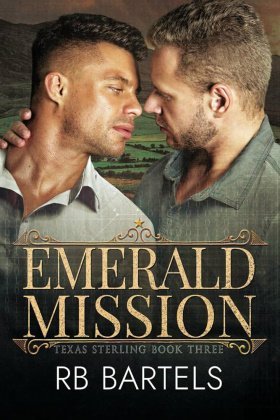“This is it. Betting counter,” Rod motioned to a counter at one end of the room. “Horses run down on the track,” he gestured toward the track. “People view the races from up here,” his arm swept the room.
“Okay, smart-ass,” Wyl chuckled. “I’m not three.”
Rod laughed and picked up a tray. They loaded their plates, paid, and scanned the room for seats.
“Those two appear friendly,” Rod nodded to where two men sat. “let’s join them.”
“They've been watching us,” Wyl whispered as they strode toward the two.
* * *
“Ailbe, they’re coming over here,” Declan whispered as Rod and Wyl approached.
“Be friendly.” Ailbe reminded Declan.
Wyl and Rod reached the tall table. “Are these seats taken?” Wyl asked.
“Not at all,” Ailbe said. “Please join us.”
“Thanks.” Rod and Wyl pulled out the stools and sat.
“You’re American, aren’t you?” Declan said.
“Yes, we are,” Rod nodded. “I’m Rod Sterling, and this is Wyl Sterling.”
Ailbe choked on a bite of roast chicken. Declan stood and pounded his back with more force than necessary.
“You’re the two guys from The Advocate,” Declan feigned surprise. “I mentioned you resembled them, and Ailbe thought I was crazy.” He stopped slapping Ailbe’s back as Ailbe reached for his drink, taking a long draw to wash down the chicken.
“Yes, that’s us,” Wyl said. “I’m surprised you read the article. Is The Advocate distributed over here?”
"We have a subscription. It comes in the mail,” Declan said.
“I’m Ailbe MacGowan,” Ailbe chimed in with a hoarse voice, wiping his face with his napkin, red-faced from the choking incident. “And this is my partner, Declan Knowlan.”
"How nice to meet you both,” Rod struggled to keep his face from showing surprise at meeting the two men they learned about from General Steinburg. “Have you been together long?”
“About six years,” Ailbe said. “And you two are married. The article in The Advocate included interesting details about your relationship. What brings you to Ireland?”
“Our honeymoon,” Wyl said. “When I asked Rod to marry me, I hoped he would accept.”
“Like I would turn him down.” Rod glanced at Wyl while keeping Ailbe and Declan in the corner of his eye.
Wyl chuckled. “I didn’t plan beyond the marriage proposal. We enjoyed a simple, quiet courthouse marriage in Santa Fe a couple of months later. We postponed the honeymoon because Rod couldn’t take time away from his college position. After a busy summer , we decided to take a break this fall. Here we are.”
“I’ve traveled to Ireland several times, but this is his first visit.” Rod nodded toward Wyl. “When the opportunity arose to do lectures, we extended our stay to enjoy the Emerald Isle. We’re here for a few weeks.”
“Which hotel are you in?” Declan asked.
“We rented a flat. We like to cook our own meals, and an apartment is roomier,” Wyl said.
“You two do come across as perfect together. Wait…” Declan jumped to his feet and pointed to Rod. “You’re Dr. Rod Bonner. The same Dr. Bonner presenting a program on Mozart operas for one of our evening lecture series events. I didn’t make the connection until now.”
“That’s right. This coming Tuesday, I believe. I’m looking forward to it.” Rod unwrapped his utensils.
Declan recovered and took his seat. “My apologies for the outburst, Dr. Bonner. Quite rude of me to point.”
“No worries, and please call me Rod.”
“Aye, and please address us by given names as well.” Declan feigned a smile. “Ailbe here is quite the opera buff. He asked me to reserve tickets for your presentation. We’ll both attend.”
“I took Rod’s class at the college.” Wyl unwrapped his own silverware. “He music knowledge is amazing.”
“Enough to snag you,” Rod chuckled and winked at Wyl.
“What if I let you snag me,” Wyl grinned at Rod.
“You two are having fun with each other, aren’t you?” Declan said. “What did I tell you, Ailbe? Couples can have fun.”
“Declan is always telling me to loosen up,” Ailbe grumbled. “I tend to be a workaholic sometimes. He reminds me life doesn’t last forever, so I must enjoy it.”
“Speaking of enjoying things,” Declan chimed in. “The races start in thirty minutes. We need to pick our nags and place our bets.” He tossed his napkin onto his empty plate and stood to take his tray to the drop-off point. “Excuse me while I stow my tray.”
Ailbe joined him with his own tray. "Fair job, Declan,” he whispered as they walked away. “They think we’re a happy gay couple.”
“I can’t believe we ran into them here,” Declan nudged Ailbe. “Let’s try to entice them to meet us out one evening.”
“Fabulous idea.”

























